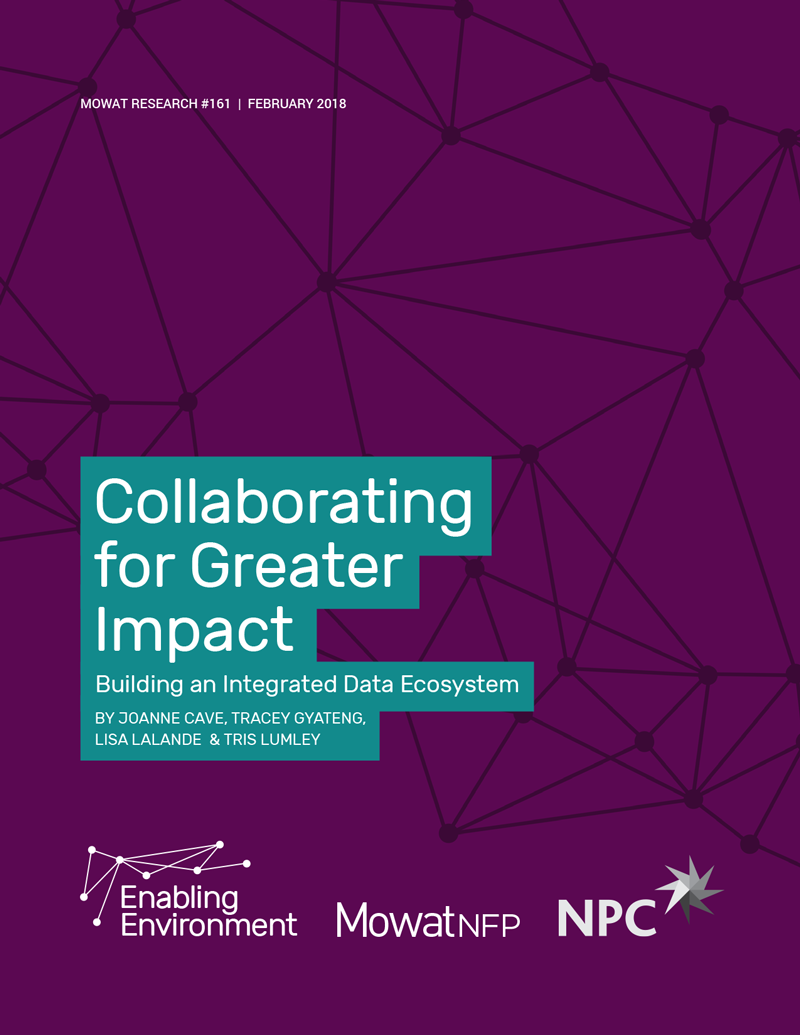February 6, 2018
Building an Integrated Data Ecosystem
The latest report from Mowat NFP’s Enabling Environment series analyzes how charities, funders, governments and academic institutions can create a more enabling environment for data collection, analysis and sharing for the charitable sectors in both Canada and the UK.
The paper provides a comparative perspective on charitable sector data usage in both Canada and the UK. This comparative approach is particularly relevant in the context of charitable and nonprofit sector data ecosystems, where the data landscape varies significantly by jurisdiction. The paper shares valuable lessons from both Canada and the UK regarding how charitable organizations have developed data infrastructure, collaborated on complex and innovative data projects and navigated the legislative and regulatory environment.
This paper – a joint project between Mowat NFP, New Philanthropy Capital, and Imagine Canada – defines the data ecosystem, summarizes the charitable data policy context, and highlights key challenges and emerging trends. It provides actionable recommendations to build a more enabling environment for data collection, analysis and sharing.
Continue Reading
Introduction
As a key service delivery partner with government, the charitable sector1 has a wealth of data on a wide range of issues – everything from environmental sustainability to homelessness and poverty reduction. Data is essential for a charity to be effective: it can be used to assess local needs and identify service gaps, inform organizational decision-making, understand trends over time, advocate for policy change, evaluate the outcomes and impact of programs and services and provide accountability and transparency to service users and the general public.
However, charitable organizations, funders and governments have identified many data challenges within the sector, including a lack of technical skillsets and organizational capacity to collect, manage and analyze data and limited culture and incentives to share data and collaborate across organizations. Data privacy legislation and regulations are essential to safeguard individuals and organizations from data breaches but often require significant organizational expertise to ensure compliance.
These data challenges are shared across governments, funders, charitable organizations and academic institutions. By working together, these sectors can use resources more efficiently, avoid unnecessary duplication, and maximize social impact. Better understanding and use of data is a core requisite for innovation and will be an important consideration in Canada’s forthcoming Social Innovation and Social Finance Strategy.2
This paper provides recommendations to support charities, funders, governments and academic institutions in creating a more enabling environment3 for data collection, analysis and sharing.
An enabling environment for data promotes openness, transparency and collaboration at all levels – from the overarching legislative and regulatory framework to the policies and procedures that govern individual organizations. Enabling environments provide the resources, tools and framework for organizations to maximize the potential value of their data. The recommendations in the paper are intended to support the transition towards a data policy framework for the charitable sector in both Canada and the UK.
Charities are not alone in trying to make sense of the issues and challenges that come with being data-informed organizations; there is a broader “data ecosystem”4 that can work together to use data in an ethical, efficient and creative way. Using the concept of a data ecosystem, this paper articulates how Canada and the UK can move forward to advance charitable sector data policy and enhance organizations’ ability to deliver programs and services that are evidence-based, outcomes-oriented and responsive to the needs of the communities they serve.
While data about the charitable sector is a strategically important asset, this paper focuses on data that is accessed, collected, shared and analyzed by the sector as part of its service delivery, research, evaluation and policy advocacy activities.
This paper:
- Defines the data ecosystem
- Summarizes the charitable sector data policy context in Canada and the UK
- Outlines emerging trends in charitable sector data policy across both jurisdictions
- Provides recommendations for building a more enabling environment for data collection, analysis and sharing
- Informs the development of a policy framework for the data ecosystem in both Canada and the UK
Authors
Joanne Cave
Tracey Gyateng
Lisa Lalande
Tris Lumley
Contributors
Adam Jog
Brittany Fritsch
Release Date
February 6, 2018
ISBN
978-1-77259-061-6
Mowat Research
No. 161

To the Enabling Environment page
- For the purposes of this paper, “charitable sector” includes charities, nonprofits, and social enterprises. [↩]
- Employment and Social Development Canada (2017). “Social Innovation and Social Finance Strategy – Consultation Document”. https://www.canada.ca/en/employment-social-development/programs/social-innovation-social-finance/consultation/discussion-guide.html. [↩]
- An enabling environment is one where the government safeguards the public interest, supports the sustainability of charities and nonprofits and optimizes the policy landscape for innovation and experimentation. Lalande, L. and Cave, J. (2017). “Charting A Path Forward: Strengthening and Enabling the Charitable Sector in Canada.” Toronto: Mowat Centre. Available at: https://mowatcentre.munkschool.utoronto.ca/charting-a-path-forward/. [↩]
- Mowat NFP has also referred to the data ecosystem as an evidence or information ecosystem in its publications. For the purposes of this paper, a data ecosystem is synonymous with an evidence or information ecosystem. [↩]








